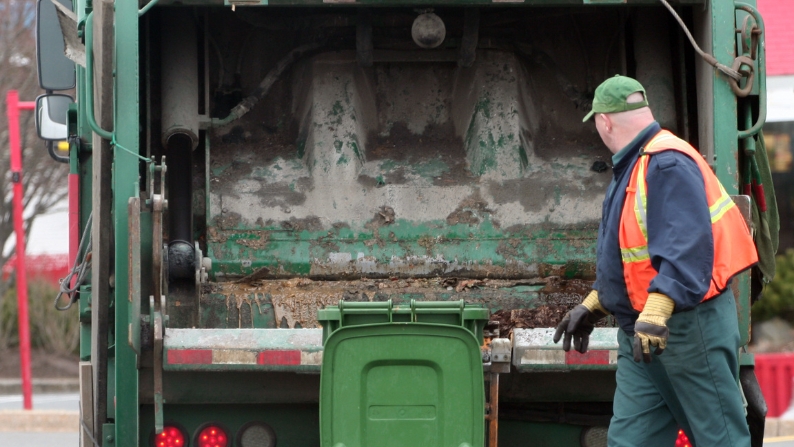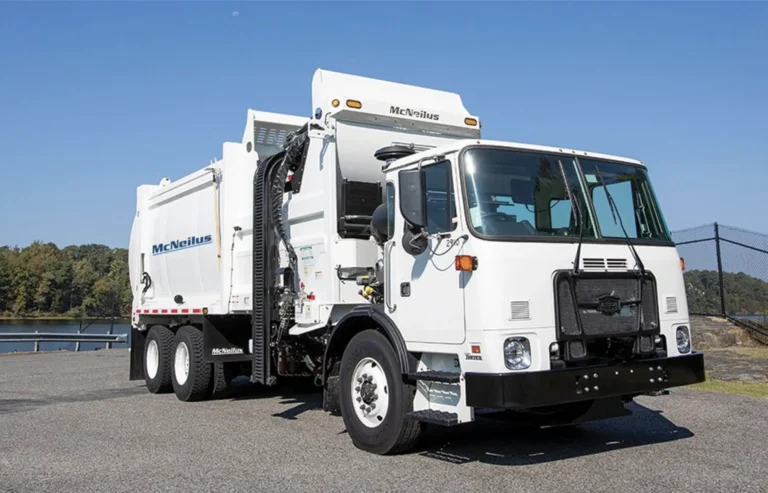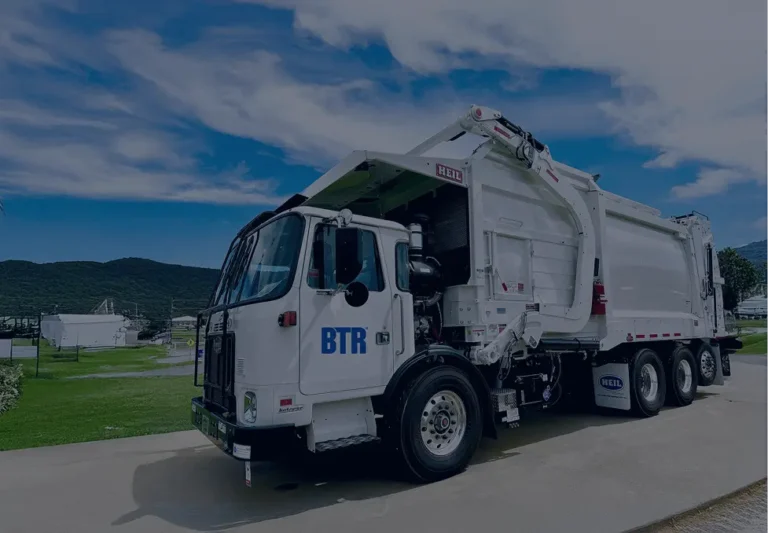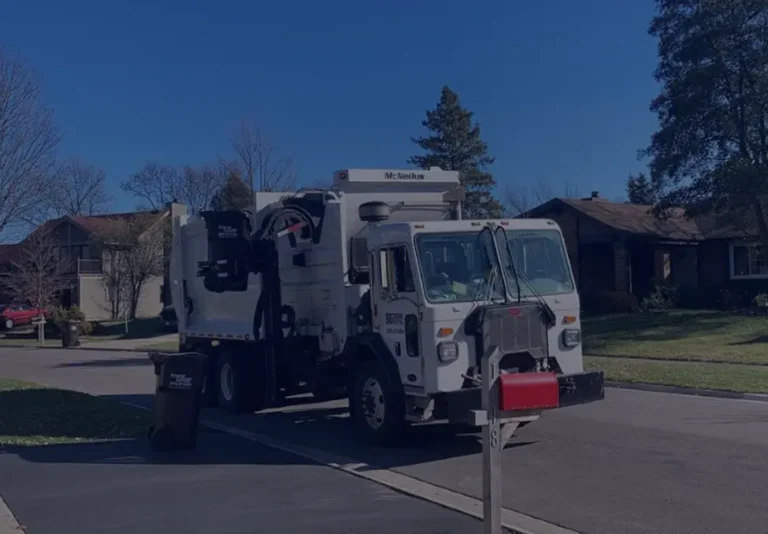Garbage trucks are essential for waste management, but their impact goes far beyond just collecting trash. Today, garbage trucks are designed not only to improve efficiency but also to reduce pollution. Through innovations in technology and design, modern trucks are helping to make waste collection more sustainable while also making the process faster and more cost-effective.
Let’s take a look at how garbage trucks are improving efficiency and reducing pollution.
How Garbage Trucks Improve Efficiency
The quicker and more efficiently waste is collected, the less time trucks spend on the road, and the more money and energy are saved. Here are some ways garbage trucks improve efficiency:
Automated Collection Systems
Many modern garbage trucks use automated collection systems. These refuse trucks are equipped with mechanical arms or hydraulic lifts that automatically pick up and dump large trash bins into the truck. This method reduces the need for workers to physically load the bins, which speeds up the process. With automation, the collection process becomes faster, safer, and more efficient, allowing a single driver to handle the collection without assistance.
Compaction Technology
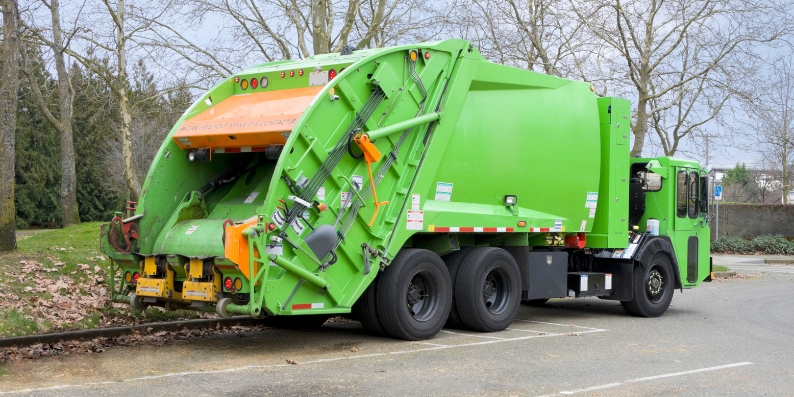
Another way waste trucks improve efficiency is through compaction systems. These systems compress waste into smaller spaces, allowing the trucks to carry more waste in fewer trips. Compaction reduces the number of trips needed to dispose of waste, which in turn reduces fuel consumption, lowers labor costs, and minimizes traffic congestion.
Optimized Routes and Fleet Management
With the help of technology, garbage trucks now use route optimization software. This software calculates the most efficient routes, taking into account factors like traffic, road conditions, and waste volumes. By improving route planning, trucks spend less time on the road, reduce fuel consumption, and collect waste more effectively. Fleet management systems also help track truck performance, ensuring they are running smoothly and efficiently.
Advanced Hydraulic Systems
Modern garbage trucks are equipped with advanced hydraulic systems that enable faster and smoother loading and unloading processes. These systems enable quicker lifting, tipping, and compaction of waste, thereby reducing the time trucks spend at each stop. Hydraulic systems also make it easier for drivers to handle large volumes of waste, improving overall efficiency.
How Garbage Trucks Help Reduce Pollution
While improving efficiency is important, reducing pollution is just as crucial in today’s world. Garbage trucks are evolving to be more eco-friendly, helping reduce emissions and minimize their environmental impact.
Lower Emissions with Eco-Friendly Trucks
One of the most significant advancements in garbage truck technology is the shift toward electric and natural gas-powered vehicles. These trucks produce fewer emissions compared to traditional diesel-powered trucks, helping to reduce air pollution. Electric garbage trucks, in particular, are zero-emission vehicles that don’t release harmful pollutants into the air. This is especially beneficial in urban areas where air quality can be a concern.
Fuel Efficiency
Today, garbage trucks are designed to be more fuel-efficient. Many trucks now feature hybrid engines that combine traditional fuel sources with electric power to improve fuel consumption. These hybrid engines use less fuel, reducing carbon emissions and making waste collection more environmentally friendly. Additionally, aerodynamic designs help reduce drag and improve fuel efficiency, allowing trucks to use less fuel while traveling on the road.
Reducing Traffic and Carbon Footprint
Route optimization isn’t just about improving efficiency—it also helps reduce pollution. By finding the quickest and most efficient routes, refuse trucks spend less time on the road, resulting in lower fuel consumption and fewer emissions. This also leads to less congestion on the roads, which in turn reduces the overall carbon footprint of the entire waste collection process.
How Improving Efficiency Can Reduce Pollution
Improving the efficiency of garbage trucks goes beyond just faster waste collection—it plays an important role in reducing pollution. Here’s how improving efficiency can directly help reduce pollution.
Fuel Savings through Optimized Routes
Efficient route planning helps trucks take the quickest, most direct paths, cutting down on fuel consumption and carbon emissions. With route optimization software, trucks spend less time on the road, reducing pollutants and traffic congestion.
Fewer Trucks on the Road
Efficiency means reducing the number of trucks required for waste collection. Using larger, more efficient trucks or maximizing capacity reduces the number of vehicles on the road, cutting down on both fuel consumption and emissions.
Promoting Sustainable Practices
Efficient garbage trucks also support sustainable waste management practices. Many trucks now separate recyclables from waste, helping to reduce landfill use, conserve resources, and lower environmental impact.
Need an Eco-Friendly Garbage Truck?
If you’re looking to upgrade your waste management process with a more efficient, eco-friendly garbage truck, contact Big Truck Rental today. We offer a range of garbage trucks for sale or rent to help you improve efficiency and reduce your environmental footprint. Let us help you make your waste collection greener!
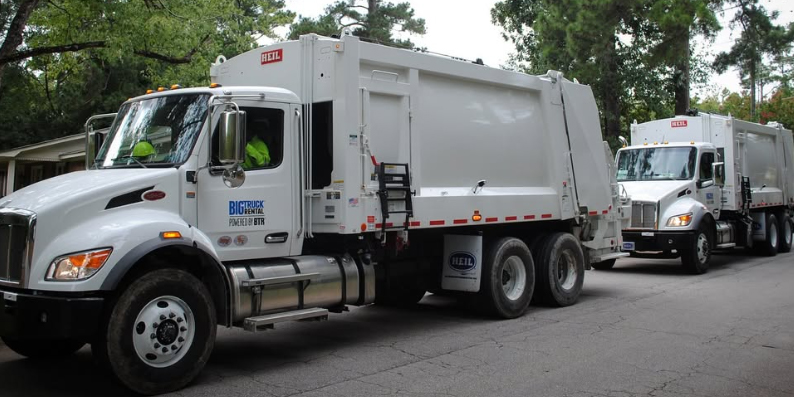
Final Thoughts
As waste management becomes more crucial to urban development, garbage trucks are playing a key role in improving efficiency and reducing pollution. With innovations like electric and hybrid trucks, route optimization, and automated collection systems, these trucks are making waste collection faster, cleaner, and more environmentally friendly. By adopting these technologies, we can create a cleaner, greener future and contribute to reducing the environmental impact of waste management.
FAQs
How does driver behavior impact garbage truck emissions?
Driver behavior directly impacts fuel efficiency and emissions. Training drivers to follow best practices, such as avoiding harsh braking and accelerating slowly, can reduce fuel consumption and emissions.
How do garbage truck fleets monitor their environmental impact?
Fleet management systems are equipped with real-time monitoring of truck performance, including fuel use and emissions. This data allows managers to track the environmental impact of the fleet, identify inefficiencies, and make adjustments to improve overall sustainability.
What is the impact of garbage truck noise pollution on communities?
Traditional garbage trucks can create significant noise pollution, especially during early morning collections. Quieter trucks, like electric models, help reduce this disruption in residential neighborhoods, contributing to a more peaceful environment for residents.
How does route optimization reduce pollution?
Route optimization software calculates the most efficient route for garbage trucks, reducing the time spent on the road, fuel consumption, and overall emissions.
Can garbage trucks help with recycling?
Yes, many modern garbage trucks come equipped with compartments for separating recyclables from regular waste, making the recycling process easier and more efficient.
